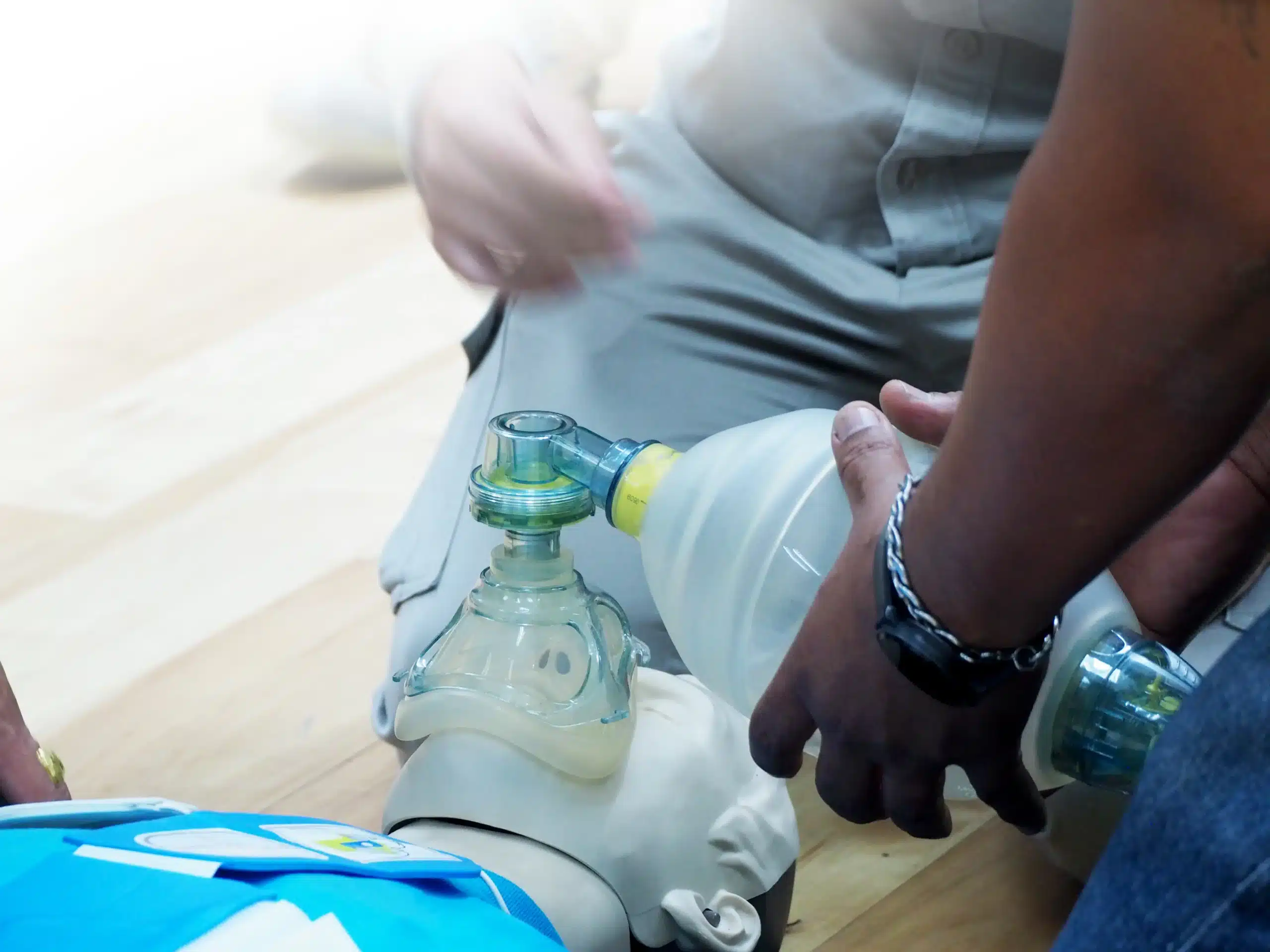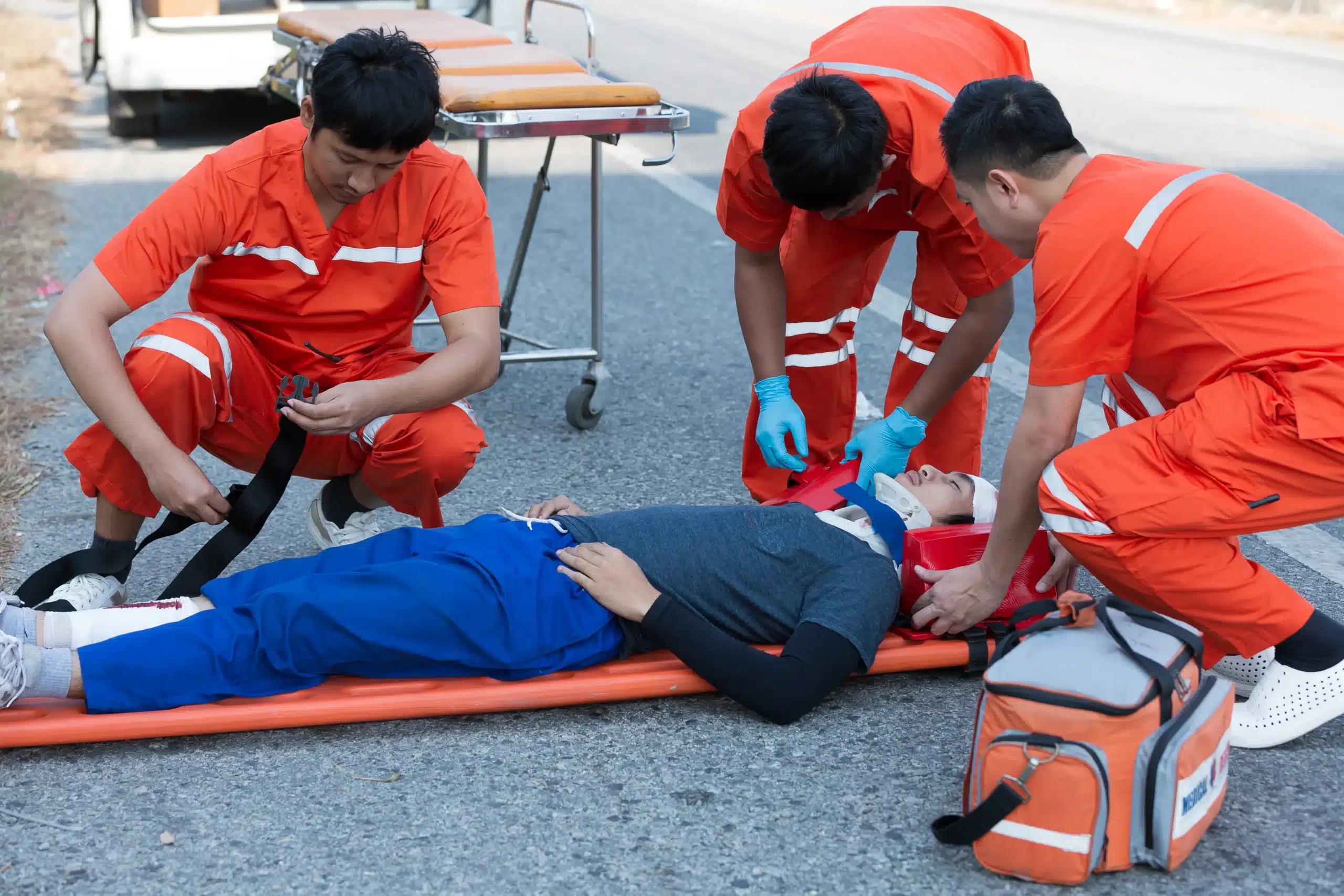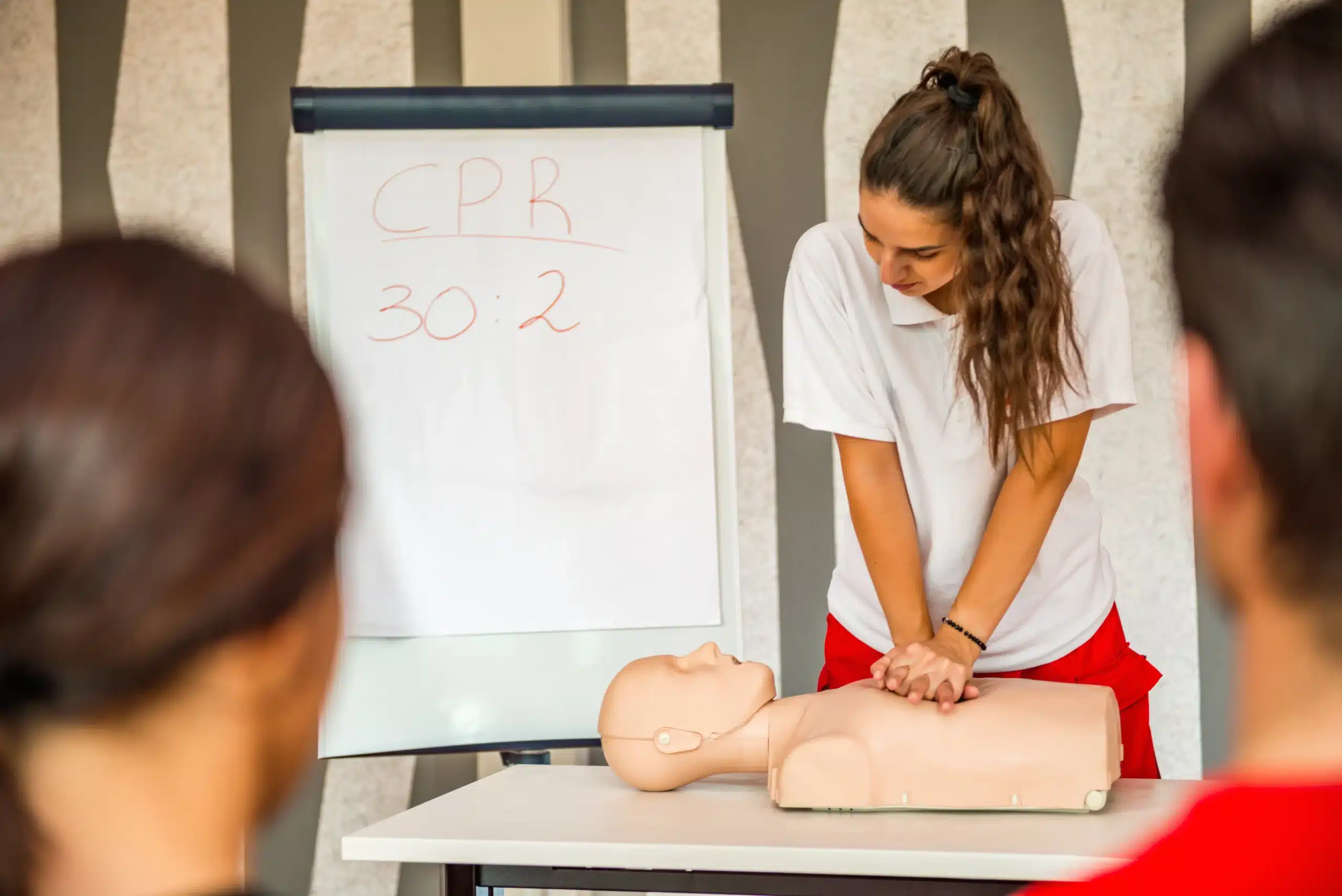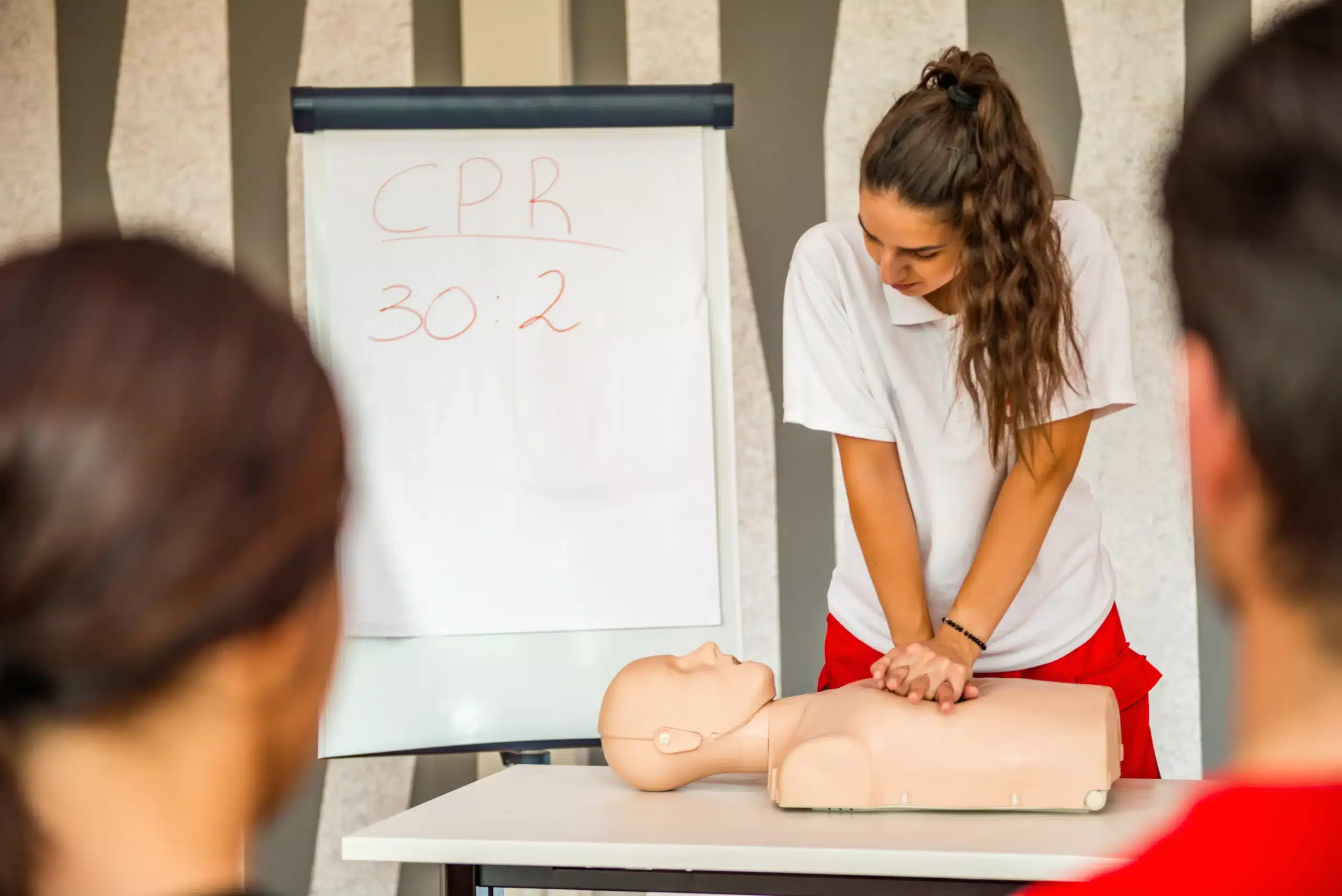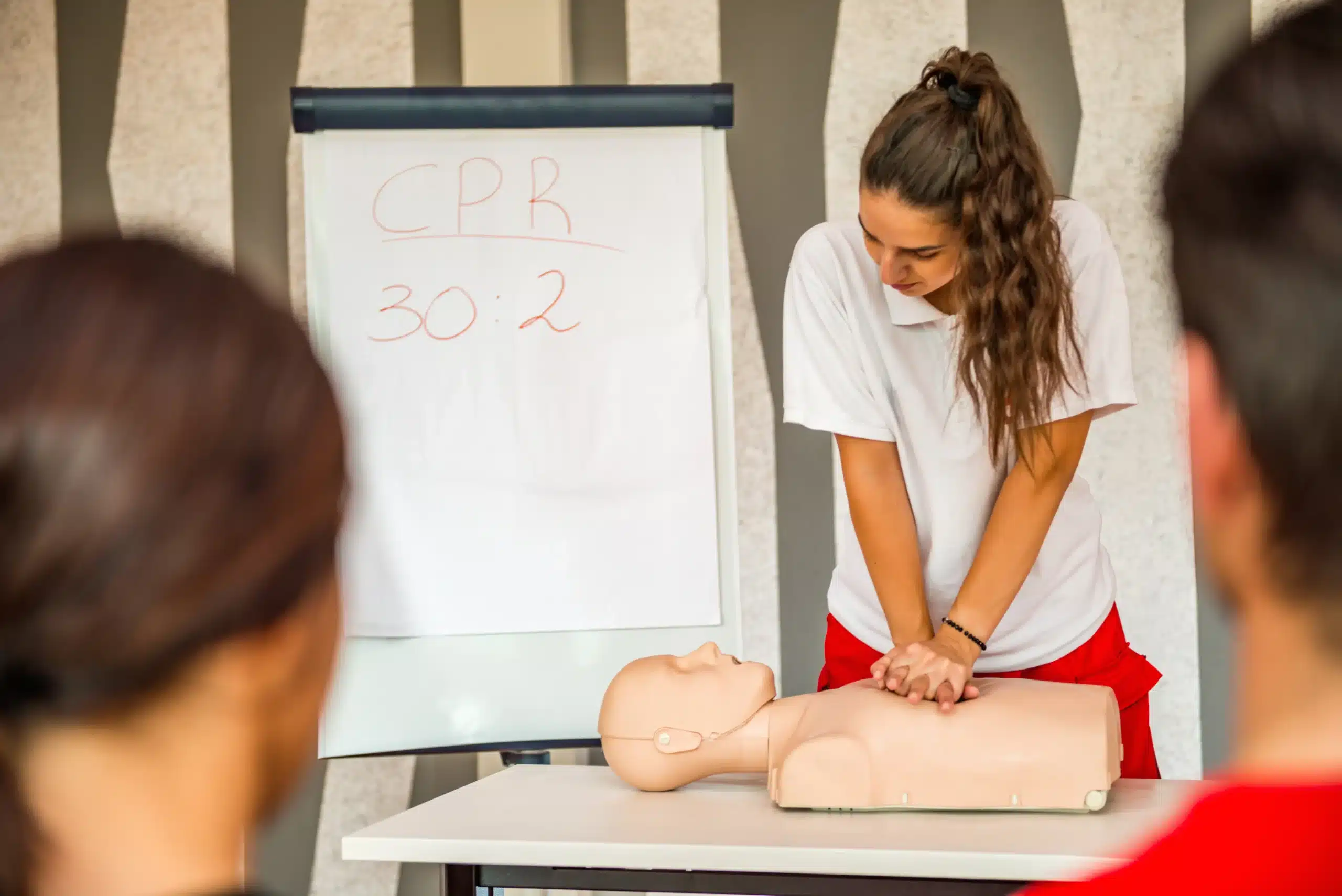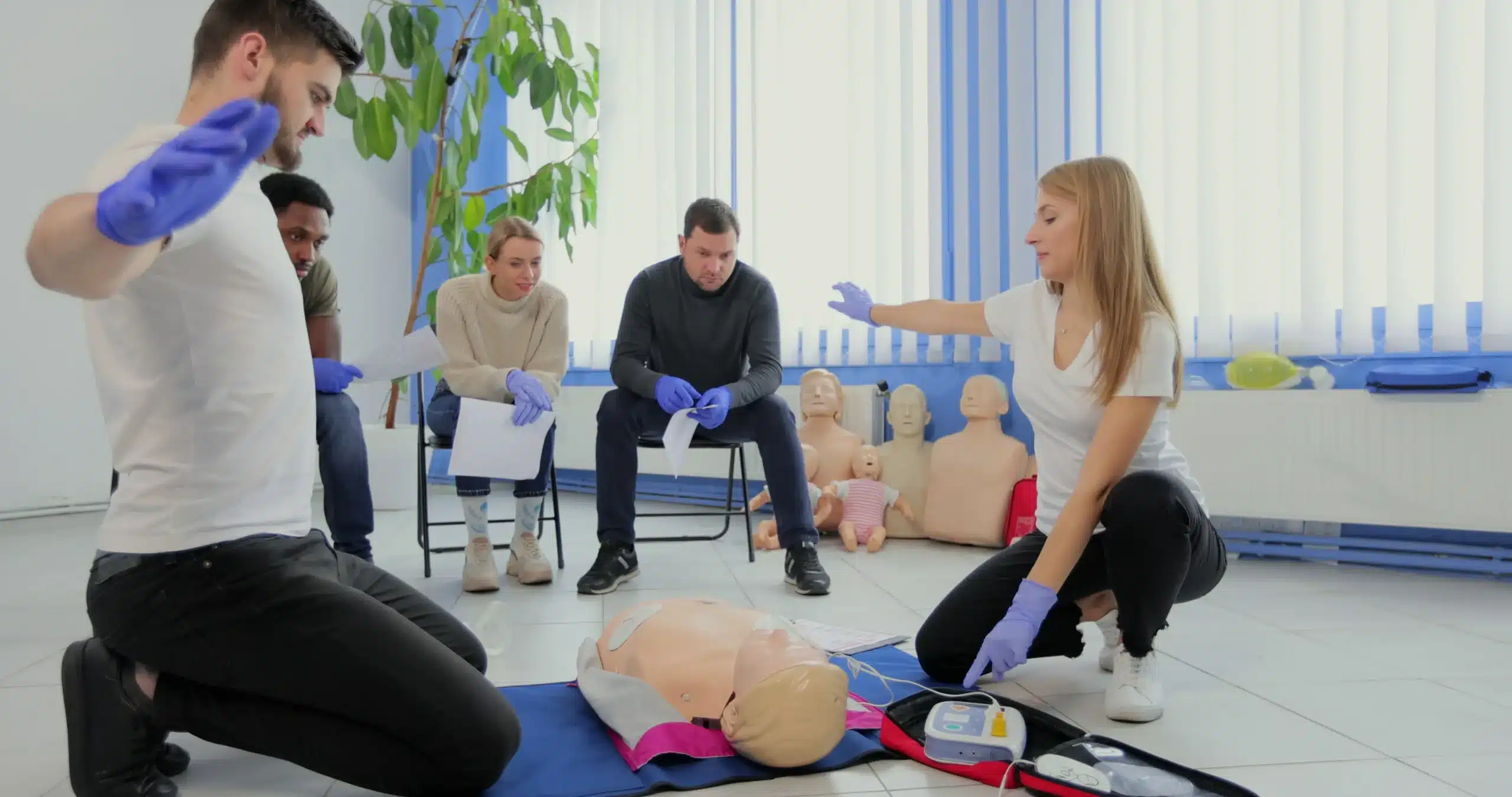In the bustling healthcare scene of Walnut Creek, staying on top of certifications is a constant challenge. RQI (Resuscitation Quality Improvement) offers a refreshing solution for busy professionals seeking efficient CPR training. This program blends online learning with hands-on practice, allowing you to learn at your own pace and master essential life-saving skills. This article serves as your comprehensive guide to RQI in Walnut Creek. We’ll delve into the key differences between RQI and traditional CPR courses, explore the advantages of this innovative approach, and provide practical tips for finding the perfect RQI program in Walnut Creek.
Key Takeaways
- RQI provides a modern, flexible approach to CPR certification: The program’s blended learning format and emphasis on frequent practice makes maintaining your skills easier and more convenient than traditional CPR courses.
- RQI equips you with essential life-saving skills: Whether you’re a healthcare professional, a childcare provider, or simply a concerned community member, RQI training empowers you to confidently respond to emergencies.
- RQI is accessible and affordable in Walnut Creek: Several training providers offer a range of RQI courses, often with group discounts and low price guarantees, making it easier than ever to get certified.
What is RQI? A Modern Approach to CPR Certification
The Resuscitation Quality Improvement (RQI) program offers a modern approach to CPR certification, focusing on efficiency and skill retention. Designed for healthcare professionals, RQI streamlines maintaining essential certifications like Basic Life Support (BLS), Advanced Cardiovascular Life Support (ACLS), and Pediatric Advanced Life Support (PALS).
RQI blends online learning with hands-on practice. You’ll start with a concise online course, typically about two hours long. Then, you’ll complete a skills assessment using a voice-assisted manikin (VAM) that gives you immediate feedback. This combination of online learning and in-person skills sessions makes renewing your certifications more convenient. The RQI program also uses objective, computer-based assessments, ensuring a standardized and rigorous evaluation of your skills. This differs from traditional CPR certification, which often relies on subjective evaluations. RQI helps healthcare providers in Concord, Walnut Creek, and Pleasant Hill stay current on their certifications and confidently respond to emergencies.
RQI vs. Traditional CPR: Key Differences & Benefits
RQI (Resuscitation Quality Improvement) represents a significant shift in how healthcare professionals maintain their CPR skills. Unlike traditional CPR courses that require infrequent renewal, RQI offers a more flexible and efficient approach. Let’s explore the key differences and benefits:
Get Certified Immediately
One of the most appealing aspects of RQI is the ability to get certified the same day. With traditional CPR classes, you often wait for your certification card. RQI streamlines this process, providing you with your certification immediately upon successful completion of the RQI course. This is a huge advantage for busy professionals who need to maintain their credentials without delay.
Flexible Learning
RQI programs understand the demands of a healthcare career. The RQI program begins with an online portion, allowing you to learn the material at your own pace. This online component typically takes around two hours to complete and provides a solid foundation before you move on to the hands-on skills session. This blended learning approach makes it easier to fit the training into your busy schedule.
Practice Frequently
RQI emphasizes frequent practice to maintain optimal CPR performance. Instead of cramming for a single test every two years, RQI encourages regular, short practice sessions. This consistent reinforcement of skills leads to improved proficiency and confidence in real-life emergencies. Real-time feedback during these sessions helps you refine your technique and ensures you’re providing high-quality CPR.
Simulation-Based Training
RQI incorporates simulation-based training using voice-assisted manikins (VAMs). These advanced manikins provide real-time feedback on your compressions and ventilations, helping you master the proper techniques. This hands-on practice with VAMs is an integral part of the RQI program and ensures you’re fully prepared to respond effectively in a real-world resuscitation scenario. You’ll develop muscle memory and confidence through repeated practice with realistic simulations.
RQI Courses in Walnut Creek
RQI courses offer a flexible and convenient way to stay up-to-date on your life-saving skills. Whether you need BLS, ACLS, or PALS certification, you can find the right RQI course in Walnut Creek. Let’s explore the different RQI options available.
BLS RQI
The Basic Life Support (BLS) RQI course is essential for healthcare professionals, first responders, and anyone who wants to learn CPR. This course covers core life-saving skills, including CPR, AED use, and relief of choking. The BLS RQI program combines online learning with hands-on skills sessions. This blended learning approach lets you study the material at your own pace online and then demonstrate your skills in person. Safety Training Seminars explains that the online portion takes about two hours to complete, making it easier to fit the training into your busy schedule. After completing the online portion, you’ll attend a short skills session to practice and be evaluated.
ACLS RQI
The Advanced Cardiovascular Life Support (ACLS) RQI program is designed for healthcare providers who manage cardiovascular emergencies. This course builds upon the fundamentals of BLS and covers advanced techniques for treating cardiac arrest, stroke, and other life-threatening conditions. Like the BLS RQI course, ACLS RQI uses a blended learning format. You’ll complete online coursework and then attend a hands-on skills session. Safety Training Seminars points out that this combination of online learning and in-person practice ensures you’re well-prepared to handle these critical situations. The ACLS RQI program equips you with the knowledge and skills to provide timely and effective care during cardiovascular emergencies.
PALS RQI
Pediatric Advanced Life Support (PALS) RQI is crucial for healthcare providers who care for infants and children. This course focuses on the specialized skills needed to respond to pediatric emergencies. PALS RQI covers topics such as respiratory distress, shock, and cardiac arrest in children. The course follows the same blended learning format as BLS and ACLS RQI, with an online component and a hands-on skills check. According to Safety Training Seminars, you’ll receive your American Heart Association PALS certification on the same day you complete the skills check, so you’re ready to respond to pediatric emergencies. PALS RQI provides the essential training needed to provide high-quality care to young patients.
Who Needs RQI Training in Walnut Creek?
RQI training offers a flexible and efficient path to CPR certification, benefiting a wide range of individuals in Walnut Creek. Whether you’re a healthcare provider, first responder, childcare professional, or community member, understanding the value of RQI can help you determine if it’s the right choice.
Healthcare Professionals
Healthcare professionals in Walnut Creek, including doctors, nurses, and medical assistants, can significantly benefit from the RQI program. It’s a modern and efficient way to obtain official American Heart Association BLS, ACLS, and PALS certifications. The program’s emphasis on frequent practice and simulation-based training helps medical personnel maintain their skills and confidently respond to emergencies.
First Responders
First responders, such as EMTs and paramedics, require up-to-date CPR credentials. The RQI program provides the essential training to enhance their life-saving skills. The flexible, online portion of the RQI course makes it easier for busy professionals to complete the coursework.
Childcare Providers
For those working in childcare, having current CPR and first aid training is often mandatory. RQI training equips childcare providers with the knowledge and skills to respond effectively in emergencies involving children, creating a safer environment. Anyone interested in learning these vital life-saving skills can find CPR training in Walnut Creek.
Community Members
RQI training isn’t just for professionals. Community members, regardless of their profession, can also benefit from this valuable training. Learning CPR empowers individuals with the confidence to respond to emergencies and potentially save lives. It’s a valuable resource for anyone looking to be prepared and make a difference. Learn more about CPR training options in Walnut Creek.
The RQI Advantage: Innovative Features & Learning
RQI certification blends online learning with hands-on skills practice. This approach offers several advantages over traditional CPR training. Let’s explore some key features that make RQI a modern and effective way to learn life-saving skills.
Voice-Assisted Manikins (VAM)
RQI training uses voice-assisted manikins (VAMs) to provide real-time feedback on your CPR technique. These manikins guide you through the process, offering immediate feedback on compression depth and rate. This interactive learning helps you develop muscle memory and master proper CPR skills, ultimately improving CPR performance and patient outcomes. As Safety Training Seminars in Walnut Creek explains, “The manikin and the real-time feedback during training and clinical practice improves CPR performance, and quality CPR saves lives.”
Blended Learning
One of RQI’s most convenient features is its blended learning approach. You’ll begin with online coursework, covering essential concepts and procedures at your own pace. This flexible format helps you fit the training into your schedule. Safety Training Seminars notes, “The first step is online. Students will take about 2 hours to finish the online part of the course.” This online portion is followed by hands-on skills sessions, ensuring you gain both the knowledge and practical skills to perform CPR effectively.
Data-Driven Training
RQI uses a data-driven approach to assess your skills. Unlike traditional CPR courses that rely heavily on instructor observation, RQI uses computer-based assessments to measure your performance objectively. This objective feedback identifies areas for improvement and ensures consistent evaluation. The American Heart Association highlights this, stating, “RQI is more objective because it’s a computer-based assessment. I find that actual assessment rigor is better; it’s less subjective and more objective.”
Improve Skills Continuously
RQI emphasizes continuous improvement through frequent practice and feedback. Short, regular skills sessions help you maintain proficiency and build confidence. This ongoing reinforcement is crucial for providing high-quality CPR in emergencies. The American Heart Association emphasizes that this consistent practice “improves CPR performance, and quality CPR saves lives.”
RQI Pricing & Enrollment in Walnut Creek
Getting RQI certified doesn’t have to break the bank. Concord CPR Classes offers a low price guarantee on its courses, including BLS, ACLS, and PALS RQI training. Plus, if you’re training with a group, ask about discounted group rates to make training even more affordable. This commitment to accessibility makes high-quality CPR training a realistic option for everyone in the Walnut Creek area.
Costs & Discounts
Concord CPR Classes understands the importance of affordable training. They offer competitive pricing on all their RQI courses and even have a low price guarantee to ensure you’re getting the best value. This makes it easier for individuals and groups in Walnut Creek, Concord, and Pleasant Hill to access these essential life-saving skills. For larger groups, discounted rates are available, making it a cost-effective solution for organizations training multiple staff members.
Enroll in RQI
Enrolling in an RQI course is straightforward. The first step is completing the online portion, which typically takes about two hours. After that, you’ll schedule a short skills evaluation session in person. This blended learning approach offers flexibility, allowing you to learn the cognitive material at your own pace before demonstrating your skills. Remember, you’ll need to finish the online portion before you can schedule your in-person skills check.
Materials & Prerequisites
One of the great things about RQI training with Concord CPR Classes is the simplicity. There aren’t extensive materials to purchase beforehand. You’ll receive a free keychain CPR mask when you attend your skills session. The most important prerequisite? Just bring yourself and your completed online coursework. You can find more information on course preparation on the Walnut Creek CPR Classes website.
RQI Training Providers in Walnut Creek
Finding the right RQI training provider is key to a smooth and successful certification experience. Here are a few reputable options in Walnut Creek:
Concord CPR Classes
Concord CPR Classes offers a range of courses, including BLS, ACLS, PALS, and First Aid. These classes teach essential life-saving techniques, from CPR and AED use to basic first aid skills. They focus on making these skills accessible through a low price guarantee and group discounts. This makes them a great option for those seeking affordable, high-quality training. They also offer the American Heart Association RQI program for quick certification.
Safety Training Seminars
Safety Training Seminars is a woman-owned AHA Training Center providing high-quality American Heart Association courses, including BLS, ACLS, PALS, CPR, and First Aid. They offer convenient scheduling with classes available every day of the week in Walnut Creek and surrounding areas. For busy healthcare professionals, they also provide online BLS CPR courses.
Walnut Creek CPR Classes
Walnut Creek CPR Classes emphasizes the American Heart Association RQI program as a modern and efficient way for medical professionals to get their BLS, ACLS, and PALS certifications. Their training includes skills testing with voice-assisted manikins (VAMs), preparing students for real-world scenarios. This hands-on approach helps participants gain practical experience and confidence in their abilities.
Overcome RQI Enrollment Challenges
Let’s face it: finding the right course and signing up can sometimes feel like a challenge. This section helps you find the information you need to get RQI certified. We’ll cover finding available courses, simplifying registration, managing costs, and raising RQI awareness.
Find Available Courses
The American Heart Association RQI (Resuscitation Quality Improvement) program is a popular, modern way for medical and healthcare professionals in Walnut Creek to get their official American Heart Association BLS, ACLS, and PALS certification. Start your search by checking local training centers like Concord CPR Classes. Often, these providers list their course schedules and availability online. You can also check with professional organizations or hospitals in your area, as they may offer RQI courses.
Simplify Registration
RQI programs often use a blended learning approach. This means you’ll complete some coursework online before attending an in-person skills session. Online registration is typically straightforward. Look for a clear “Register Now” button on the training provider’s website. Have your basic information ready, like your name, contact details, and preferred course dates. Some providers may require you to create an account before registering.
Manage Costs
RQI training involves costs for the course materials, online access, and in-person skills sessions. Look for providers like Safety Training Seminars that offer discounts for group classes. Some employers may also cover the cost of RQI training for their employees, so it’s worth checking with your HR department. If you’re paying out of pocket, consider budgeting for the training in advance.
Raise RQI Awareness
One of the biggest hurdles to wider RQI adoption is simply awareness. Many people, even within the healthcare field, aren’t familiar with the program. Sharing information about RQI with your colleagues and peers can help spread the word. You can also advocate for RQI adoption within your workplace. Correcting common misconceptions, like the idea that CPR is only for professionals, can also encourage more people to seek out RQI training.
Maximize Your RQI Experience: Tips for Success
RQI certification offers a streamlined and efficient path to maintaining your life-saving skills. To make the most of your RQI training, consider these practical tips:
First, dedicate ample time to the online portion of the course. This foundational knowledge is essential for success in the hands-on skills session. Think of it as building a strong base before adding the rest of your skills. Most students find that setting aside about two hours allows them to fully absorb the online material.
Next, take advantage of the voice-assisted manikin (VAM) during your skills testing. The VAM provides real-time feedback on your compressions and ventilations, allowing you to refine your technique and build confidence. Don’t hesitate to ask your instructor for clarification or guidance—they are there to support you.
Pay close attention to the real-time feedback provided by the VAM and your instructor. This feedback is crucial for identifying areas for improvement and ensuring you’re performing CPR effectively. It helps you understand exactly what you’re doing well and where you can adjust your technique. Remember, quality CPR saves lives, and consistent practice is key.
Before your skills test, review the online materials thoroughly. This refresher will ensure you’re well-prepared and confident in your abilities. Think of it as a final dress rehearsal before the main performance. This preparation can significantly reduce stress and improve your performance. And finally, remember that consistent practice is essential for maintaining proficiency in CPR. Regularly reviewing the material and practicing your skills will ensure you’re always ready to respond effectively in an emergency.
RQI FAQs in Walnut Creek
Have questions about the RQI program in Walnut Creek? We’ve got answers. This FAQ covers common questions about RQI certification, helping you understand the process and benefits.
What is the RQI Program?
The RQI (Resuscitation Quality Improvement) program offers a blended learning approach to CPR certification. It combines online coursework with hands-on skills sessions, allowing healthcare providers to learn at their own pace and refresh their skills regularly. This modern approach ensures competency and improves CPR quality. You can explore more program details through resources like the BLS RQI Program offered by Safety Training Seminars in Walnut Creek.
How long does RQI training take?
The online portion of the RQI course takes approximately two hours to complete. This online training is a prerequisite for the in-person skills evaluation session. The skills session itself is relatively short, focusing on demonstrating proficiency in the techniques learned online. Review the BLS RQI Program details for more information on scheduling and session length.
What are the benefits of RQI certification?
RQI certification emphasizes high-quality CPR performance through regular practice and feedback. This focus leads to improved skills and better outcomes in real-life emergencies. Real-time feedback during training and practice enhances CPR skills and ultimately saves lives.
Is RQI certification recognized?
Yes, RQI certification is widely recognized and accepted. The RQI program is a popular and efficient way for medical professionals to obtain their American Heart Association (AHA) BLS, ACLS, and PALS certifications. Learn more about available CPR and First-aid classes in Walnut Creek and the certifications offered.
What is the cost of RQI certification?
The cost of RQI certification can vary. Many providers offer competitive pricing and a low-price guarantee. For specific pricing details and available discounts for courses in Walnut Creek, contact a provider directly. They often have flexible scheduling options to accommodate busy professionals.
Related Articles
- RQI Classes in Concord, CA – Concord CPR Classes
- Why CPR is Critical in Healthcare
- Your Guide to CPR Classes in Walnut Creek – Concord CPR Classes
- Best Online ACLS Classes in Pleasant Hill – Concord CPR Classes
- Group CPR Classes Walnut Creek: A Complete Guide – Concord CPR Classes
Frequently Asked Questions
What exactly is RQI and how does it differ from traditional CPR training?
RQI, or Resuscitation Quality Improvement, is a more flexible system for healthcare providers to maintain their CPR skills. Instead of one big class every two years, RQI uses shorter, more frequent practice sessions combined with online learning. This helps build muscle memory and improve long-term retention of these crucial skills. You’ll use high-tech manikins that give you instant feedback, so you know exactly how to improve your technique.
I’m a busy healthcare professional. How can I fit RQI training into my schedule?
RQI is designed with busy professionals in mind. The online portion lets you learn the material whenever and wherever it’s convenient for you. The in-person skills sessions are short and can often be scheduled on the same day, making it much easier to fit into a packed schedule. You can even get certified the same day you complete your skills check.
What if I don’t work in healthcare? Can I still take RQI training?
While RQI is geared towards healthcare professionals needing to maintain specific certifications, the core skills taught are valuable for anyone. If you’re interested in learning or refreshing your CPR skills, check with your local training center. They can advise you on the best course for your needs, whether it’s RQI or a more traditional CPR class. There are plenty of options available for non-healthcare professionals who want to be prepared for emergencies.
How much does RQI training cost, and are there any discounts available?
The cost of RQI training varies depending on the provider and the specific certifications you need (BLS, ACLS, or PALS). Many training centers offer competitive pricing and even have low-price guarantees. Be sure to ask about discounts for group training, which can be a great option for workplaces or groups of friends.
Where can I find RQI training courses in my area?
A good starting point is to search online for “RQI training” along with your city or region. You can also check with local hospitals, healthcare organizations, or community centers, as they often host or recommend training providers. Look for training centers that offer convenient scheduling and use the latest technology, like voice-assisted manikins, for the best learning experience.


